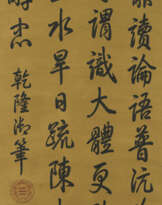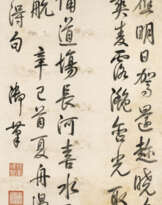ID 1086718
Lot 864 | EMPEROR QIANLONG (1711-1799, REIGNED 1736-1796)
Valeur estimée
HKD 5 000 000 – 6 000 000
Paintings after Ni Zan
Album of eight double-leaves, ink on paper
Each double-leaf measures 17 x 12.1 cm. (6 ¾ x 4 ¾ in.)
Six double-leaves of paintings, inscribed, signed and dated autumn, gengyin year (1770) on the last double-leaf, with a total of eight seals of the artist
Frontispiece on the first double-leaf, with two seals of the artist
Three seals of the artist on title pages
Provenance
Yu Zhaofan (1862-1920) collection.
Lot 3116, 8 October 2014, Heirlooms of Chinese Art from the Hosokawa Clan, Sotheby’s Hong Kong.
Literature
Kei Suzuki ed., Comprehensive Illustrated Catalog of Chinese Paintings: Vol. 4 Japanese Collections: Temples and Individuals, University of Tokyo Press, Tokyo, 1983, pp. IV-448 and IV-637, pl. JP36-053.
The Elegant World of the Literati -Chinese Ming and Qing Paintings, Calligraphy and Scholar Objects from the Morisada Hosokawa Collection I, Kumamoto Prefectural Museum of Art, Kumamoto, 6 October 1992, cat. 24.
Exhibited
Kumamoto, Kumamoto Prefectural Museum of Art, The Elegant World of the Literati -Chinese Ming and Qing Paintings, Calligraphy and Scholar Objects from the Morisada Hosokawa Collection, 9 October – 8 November 1992.
Further details
Aesthetics In Common: The Emperors’ Artworks and Imperial Collection of Paintings and Calligraphy
Since ancient China, preserving and recording historical books and documents had been a faithful operation in the imperial household, performed by officials in the Bright Hall and the Gold Depository of the Qin dynasty, the Stone Canal Pavilion of the Han period, and the Grand Literature Chamber in Tang dynasty etc. A devoted painter and calligrapher, Emperor Huizong of the Song period established the Imperial Painting Academy to gather the best artists of the time, and ordered to compile the monumental Xuanhe Catalogues of Paintings and Calligraphy, which became the model of archiving the vast imperial collections. This was followed by the Emperor Qianlong, who command to compile Treasures of the Stone Canal Pavilion in 1744 and made available a colossal amount of other literatures like The Xiqing Compilation of Antiquities, The Emperor’s Rare Books, and Treasures of the Stone Canal Pavilion II.
Through the important Magpies and Spring Flowers attributed to Emperor Huizong (Lot 863), and the three masterpieces by Emperor Qianlong - Paintings after Ni Zan (Lot 864), Calligraphy in Running Script (Lot 865) and Replanted Wutong Studio (Lot 832), we can learn about the sensational virtuosity of the two emperors.
Masterworks from the imperial collections include Wen Boren’s Resting in the Verdant Mountain (Lot 862), with Emperor Qianlong’s inscription and five of his seals, which suggest it could possibly be a shortlisted work to be featured in Treasures of the Stone Canal Pavilion. Qian Weicheng’s Blooming Flowers (Lot 866) was created for the emperor’s pleasure. While Jiang Tingxi’s six leaves of An Imperial Manual of Birds – Roosters (Lot 867) should probably be part of the albums as recorded in Treasures of the Stone Canal Pavilion, Zou Yigui’s Sailing after the Rain (Lot 868) was catalogued in Treasures of the Stone Canal Pavilion II. Lastly, Section of the Imperial Birthday Celebration (Lot 869) depicted part of the grand observance of the 60th birthday of Emperor Kangxi.
| Artiste: | Empereur Qianlong (1711-1799) |
|---|
| Artiste: | Empereur Qianlong (1711-1799) |
|---|
| Adresse de l'enchère |
CHRISTIE'S 18 Chater Road Central Hong Kong Hong Kong | ||||||||||||||
|---|---|---|---|---|---|---|---|---|---|---|---|---|---|---|---|
| Aperçu |
| ||||||||||||||
| Téléphone | +85227601766 | ||||||||||||||
| Fax | +852 2760 1767 | ||||||||||||||
| Conditions d'utilisation | Conditions d'utilisation | ||||||||||||||
| Heures d'ouverture | Heures d'ouverture
|

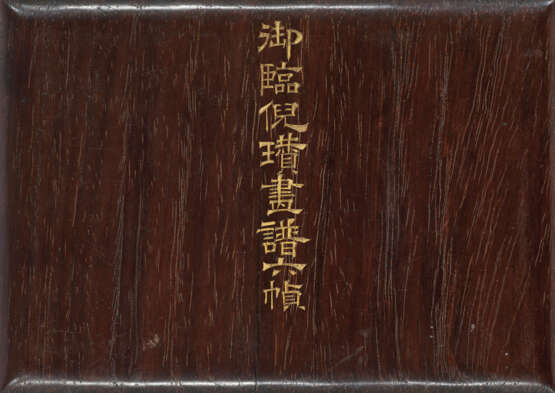




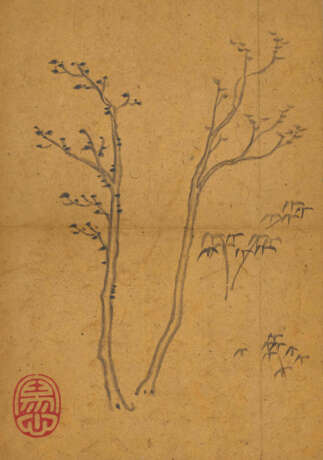




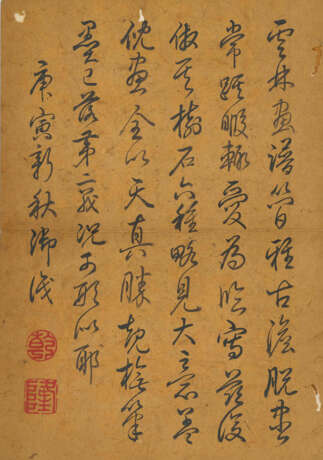


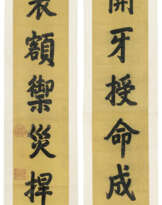
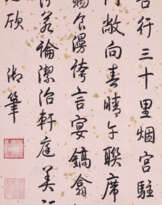
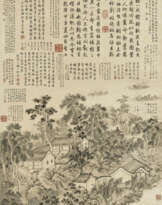
![[QIANLONG, Empereur de Chine (1711-1799) et Charles-Nicolas COCHIN (1715-1790), dir.]](/assets/image/picture_3601309/5c32d/rqfwcmyodhwl6a3u3cnvjqatap9yfxpvbnyt77bbuqb0bh1q4smembav9v5ika1700204263jpg__fix_162_205.jpeg)
